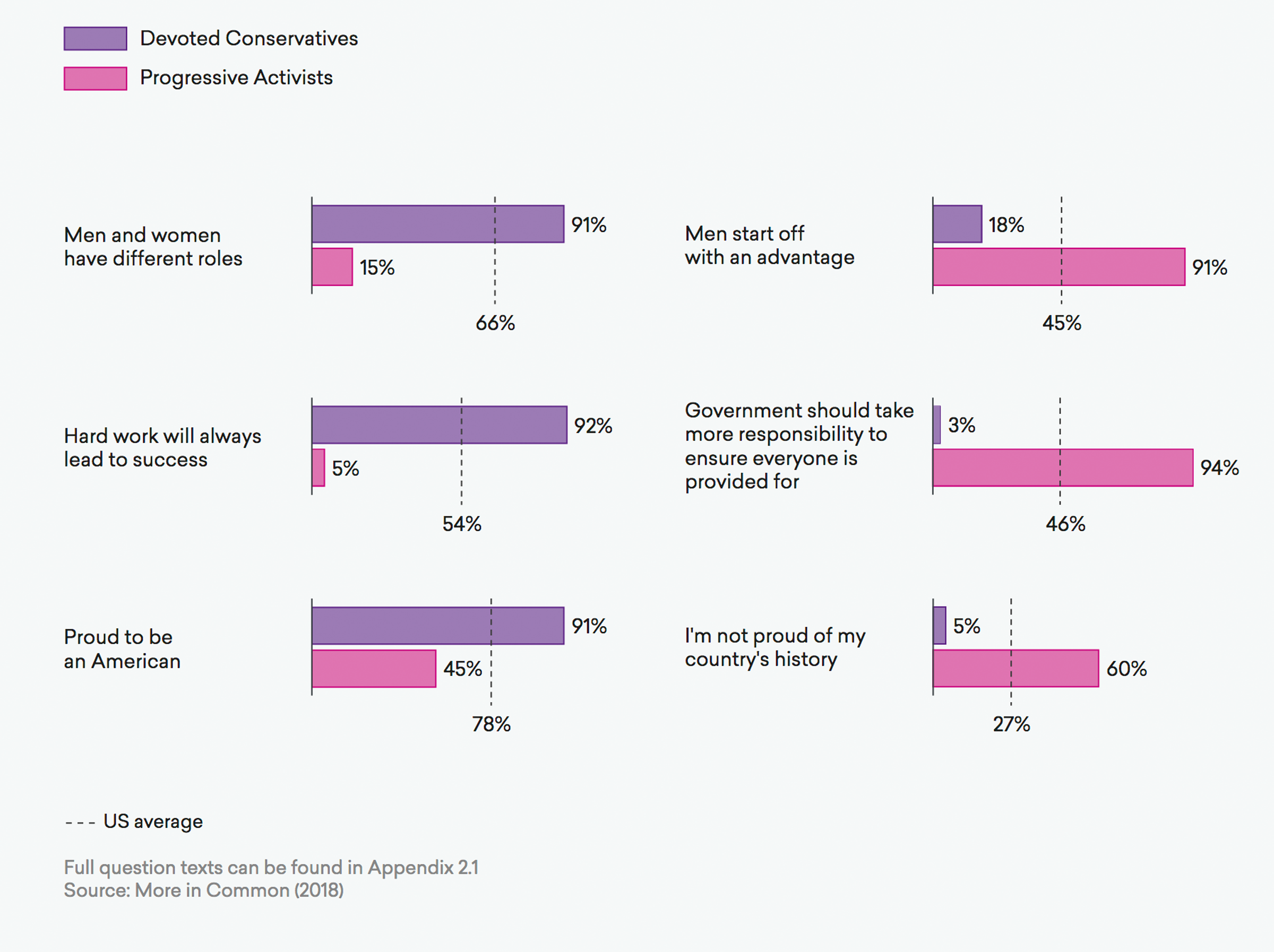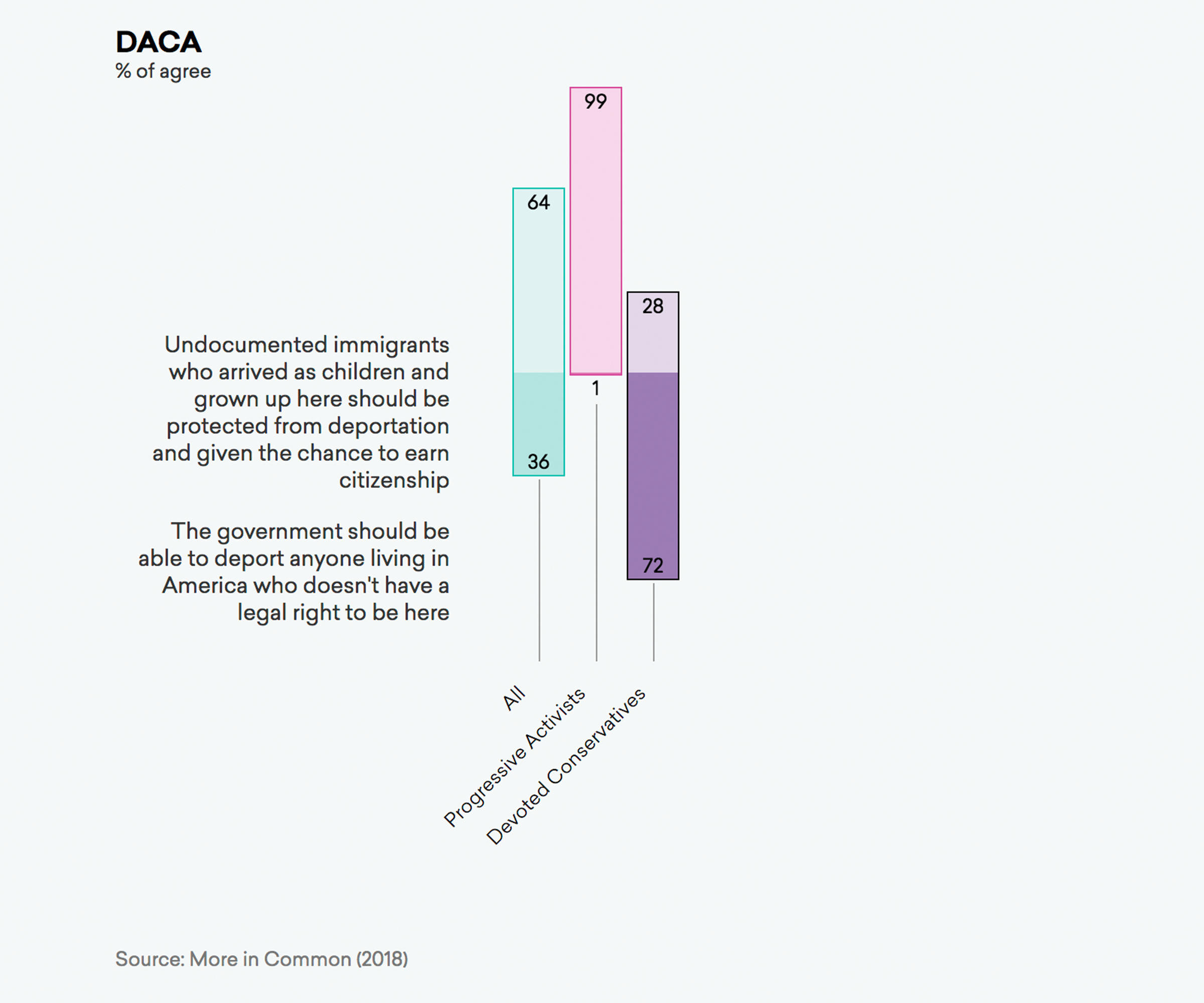Hidden Tribes of America
I wanted to share some excerpts from a website called The Hidden Tribes of America
America's Hidden Tribes
America is not split into two tribes, as we're sometimes told. In fact, we've identified seven distinct groups of Americans. These are our Hidden Tribes of America: distinguished not by who they are or what they look like, but what they believe.
The Hidden Tribes of America
Here's a quick snapshot of each group:
Progressive Activists (8 percent of the population) are deeply concerned with issues concerning equity, fairness, and America's direction today. They tend to be more secular, cosmopolitan, and highly engaged with social media.
Traditional Liberals (11 percent of the population) tend to be cautious, rational, and idealistic. They value tolerance and compromise. They place great faith in institutions.
Passive Liberals (15 percent of the population) tend to feel isolated from their communities. They are insecure in their beliefs and try to avoid political conversations. They have a fatalistic view of politics and feel that the circumstances of their lives are beyond their control.
The Politically Disengaged (26 percent of the population) are untrusting, suspicious about external threats, conspiratorially minded, and pessimistic about progress. They tend to be patriotic yet detached from politics.
Moderates (15 percent of the population) are engaged in their communities, well informed, and civic-minded. Their faith is often an important part of their lives. They shy away from extremism of any sort.
Traditional Conservatives (19 percent of the population) tend to be religious, patriotic, and highly moralistic. They believe deeply in personal responsibility and self-reliance.
Devoted Conservatives (6 percent of the population) are deeply engaged with politics and hold strident, uncompromising views. They feel that America is embattled, and they perceive themselves as the last defenders of traditional values that are under threat.
Core Beliefs and Demographics
Tribe membership (pictured here: Progressive Activists and Devoted Conservatives) predicts how people think about political issues better than standard categories (such as "Liberal" or "Republican")
The Wings
Progressive Activists and Devoted Conservatives together comprise just 14 percent of the American population—yet it often feels as if our national conversation has become a shouting match between these two groups at the furthest ends of the spectrum. Together with Traditional Conservatives (who share values and tribalism like the Devoted Conservatives, just less intensely), they compose the 33 percent of people in the groups we label the Wings.
Combined, the members of these three tribes comprise just one-third of the population, but they often dominate our national conversation. Tribalism runs deep in their thinking. Their distrust and fear of the opposing side drives many of the people in these groups, and they have especially negative opinions of each other. When people today speak about how Americans seem to hate each other, they're usually talking about the opinions and behaviors of the Wings.
The Wings are also the most unified internally. On many of the most contentious issues—race, immigration, guns, LGBTQI+ rights—the people in these three tribes express high levels of unanimity. Often more than 90 percent of people in one of these groups holds the same view about a controversial issue, and typically, it will be the reverse of whatever the opposing wing believes. In contrast, the remaining two-thirds of Americans at the center show more diversity in their political views, express less certainty about them, and are more open to compromise and change—even on issues that we all tend to consider highly polarizing.
Why do the Wings dominate the conversation? A key reason is that polarization has become a business model. Media executives have realized that they can drive clicks, likes, and views, and make money for themselves and their shareholders, by providing people with the most strident opinions. This means that the most extreme voices―no matter how outlandish―often get the most airtime. In addition, people with the most extreme views are often the most certain of their positions. They are willing to argue with anyone and avoid moderating their opinions or conceding points to the other side. All this can make entertaining television and viral social media content. But it is distorting how we see each other, fracturing our society, and adding to distortions in our political system that give undue weight to the most extreme views.
Core Beliefs of the Wings Diverge Sharply
Devoted Conservatives emphasize traditional values and American identity, while Progressive Activists are defined by a rejection of traditional authority and a focus on rectifying historical injustices

The Exhausted Majority
While the story of the Wings may be one of division and conflict, a very different story is found in the rest of America. In fact, the largest group that we uncovered in our research has so far been largely overlooked. It is a group of Americans we call the Exhausted Majority―our collective term for the four tribes, representing a two-thirds majority of Americans, who aren’t part of the Wings. Although they appear in the middle of our charts and graphs, most members of the Exhausted Majority aren’t political centrists or moderates. On specific issues, their views range across the spectrum. But while they hold a variety of views, the members of the Exhausted Majority are also united in important ways:
They are fed up with the polarization plaguing American government and society
They are often forgotten in the public discourse, overlooked because their voices are seldom heard
They are flexible in their views, willing to endorse different policies according to the precise situation rather than sticking ideologically to a single set of beliefs
They believe we can find common ground
The distinction between the Wings and the Exhausted Majority takes us beyond a simple story of the left and the right. Based on their strong views and values, we believe both Traditional Conservatives and Devoted Conservatives belong in the Wings. On the other side, Progressive Activists belong in the Wings, but Traditional Liberals belong in the Exhausted Majority. They have clear liberal views, but unlike the three Wings tribes, they have a more diverse range of opinions, seem more concerned about the country’s divisions, and are more committed to compromise.
While partisans argue and score political points, members of the Exhausted Majority are so frustrated with the bitter polarization of our politics that many have checked out completely, ceding the floor to more strident voices. This is especially true of Politically Disengaged and Passive Liberals, while Traditional Liberals and Moderates remain engaged. Members of the Exhausted Majority tend to be open to finding middle ground. Furthermore, they aren’t ideologues who dismiss as evil or ignorant the people who don’t share their exact political views. They want to talk and to find a path forward.
The Majority of Americans Want Compromise
Real Problems, Real Differences, But Real Common Ground
There is far more common ground among Americans than we might imagine, judging from the constant conflict among pundits, politicians, and social media users. This is true even on some of our most debated issues. The Hidden Tribes survey just scratched the surface on those issues.
For example, a full 81 percent of the population―including Devoted Conservatives, who tend to be the most skeptical when it comes to questions of race―agrees that racism continues to be an at least somewhat serious problem in the United States. The fact that the overwhelming majority of people acknowledge that racism is a real problem opens the door for continued conversations about how the country moves forward.
Another key area of agreement is the aspect of immigration policy regarding Dreamers: people brought to the United States illegally as children and given provisional legal status under the DACA program during the Obama administration. Three-quarters of all Americans believe there should be a pathway for these individuals to obtain citizenship through serving in the military or attending college. This exemplifies how the current polarization is leading to gridlock in American politics and preventing us from finding solutions supported by an overwhelming majority.
One issue that Americans from most tribes regularly discuss is how they feel that people have become too quick to take offense and criticize others’ use of language. Four out of five Americans believe "political correctness has gone too far in America"—a issue where most Americans with liberal views agree with Conservatives, again showing America is so much more than two tribes.
Our Shared Future
The Hidden Tribes study illuminates several new findings regarding America’s past, present, and future.
The American electorate is more complex than the oversimplified story of polarization would make us believe
The reason American society appears to be split 50/50 is that the loudest and most extreme viewpoints monopolize airtime and social media space
The majority of Americans, the Exhausted Majority, are frustrated and fed up with tribalism. They want to return to the mutual good faith and collaborative spirit that characterize a healthy democracy
Being able to discuss our genuine disagreements remains important. At the root of those disagreements are differences in core beliefs―the underlying psychological architecture that governs what we value and how we see the world
While our differences are often rooted in divergent views, that does not mean we cannot find common ground
By acknowledging and respecting the values that animate our beliefs, we can begin to restore a sense of respect and unity
The vast majority of Americans―three out of four―believe our differences are not so great that we cannot come together. Let’s make that a reality.
Quotes from:
The HiddenTribes of America
https://hiddentribes.us
Hidden Tribes of America

